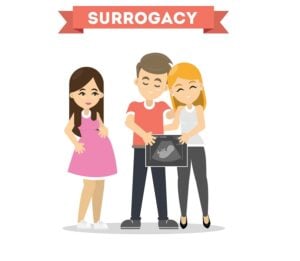[ad_1]

(Image via Getty)
Every year, I write about how Michigan’s surrogacy and parentage laws are out of step with the rest of the country, as well as the advocacy efforts for change. Here’s last year’s column. And 2021‘s. And the one from 2020. But this year may be the end of a long run. This legislative session may finally be the year that Michigan’s legislature recognizes that their outdated laws are causing tangible harm to children and families and does something about it.
The Problem
Back in the late 1980s, a surrogacy case with the worst possible facts — the Baby M Case — came to court. A “traditional” surrogate (where the surrogate is also genetically related to the child) in New Jersey changed her mind about the surrogacy arrangement and fled the state with the baby she had carried for another couple. Surrogacy was new and the situation was shocking. It caused a number of states — including Michigan — to pass anti-surrogacy laws.
But in the 30-plus years since then, assisted reproductive technology has advanced, as have the laws on surrogacy. The other states that reacted to the Baby M Case reversed their anti-surrogacy laws, and instead embraced the practice, with guardrails to protect children, families, and surrogates. Among the states reversing their positions were Washington, New York, and New Jersey; and other states, like Colorado and Oklahoma, continue to pass surrogacy-supportive laws.
Michigan stands alone as the only state in the country criminalizing surrogacy.
While people like to praise states as “laboratories of democracy,” Michigan’s outdated stance is problematic. And it has had real effects for Michiganders facing infertility struggles. Check out these podcast interviews: (1) Aubrey Gojcaj lost her ability to carry another pregnancy during the complicated birth of her first child. Aubrey’s sister generously offered to be a surrogate for her, but Michigan law challenged Aubrey’s ability to be recognized as the legal parent of her own child. (2) Born and raised in Michigan, Stephanie Jones survived a near-death experience with an ectopic pregnancy. When advised to turn to surrogacy to become a parent, she was shocked to learn it was illegal in Michigan and that she would have to leave the state for help.
The Fix
Last week the Michigan House of Representatives voted to pass the Family Protection Act (HB5207-5215). The package of bills updates Michigan’s laws relating to the legal parent-child relationship through assisted reproduction and surrogacy, including protections for donors, surrogates, intended parents, and children. The driving force behind the bill is the grassroots organization the Michigan Fertility Alliance. The volunteer group worked with local and national experts to develop the best protections for Michigan families turning to assisted reproduction.
Surrogacy Safeguards
The surrogacy bill follows carefully formulated legal language from the uniform parentage act for protections. The basic requirements included are that any surrogate be over 21 years of age, have previously given birth to at least one child, have completed a medical evaluation, have completed a mental health consultation, and have independent Michigan-licensed legal counsel representing her for the duration of the surrogacy agreement.
Similarly, intended parents must be over 21 years of age, have completed a mental health consultation, and have independent legal representation throughout the duration of the surrogacy.
Further, the law requires that the surrogacy agreement must permit the surrogate be make all health and welfare decisions regarding herself and the pregnancy, including, but not limited to, whether to consent to a cesarean section or a multiple embryo transfer. The surrogacy agreement must permit the surrogate to use the services of a health care practitioner of the surrogate’s choosing. And the surrogacy agreement must give each party the right to terminate the agreement at any time, before an embryo transfer occurs, without penalty. No financial or other form of coercion to move forward is permitted.
It’s Not Just About Surrogacy
It isn’t just Michigan’s surrogacy laws that need reform.
So, too, do Michigan’s laws relating to other fertility treatments, including egg, sperm, and embryo donation. For those not genetically related to their child — those turning to the help of a donor — no clear legal path for parental recognition exists under Michigan law. This has led to some shocking cases, including this one where a Michigan court ruled that a woman who went through fertility treatments with her partner, carried and gave birth to their twin daughters, and raised them together for seven years, was only a “surrogate” with no parental rights because she was not genetically related to her children.
This type of lack of recognition of a parent-child relationship not only strips the parent of rights but places the child in a precarious and unstable position. Without recognition of the parent-child relationship, a child can be left without basic rights to support, inheritance, and social security benefits.
It’s Time
Well, actually it is way past time. In January 2024, the Family Protection Act heads to the Senate. With any luck — or really just the commitment of enough Michigan senators looking out for Michigan families — it will pass and then head to the governor’s desk. Then I can gladly find something else to write about every year.
 Ellen Trachman is the Managing Attorney of Trachman Law Center, LLC, a Denver-based law firm specializing in assisted reproductive technology law, and co-host of the podcast I Want To Put A Baby In You. You can reach her at babies@abovethelaw.com.
Ellen Trachman is the Managing Attorney of Trachman Law Center, LLC, a Denver-based law firm specializing in assisted reproductive technology law, and co-host of the podcast I Want To Put A Baby In You. You can reach her at babies@abovethelaw.com.
[ad_2]




